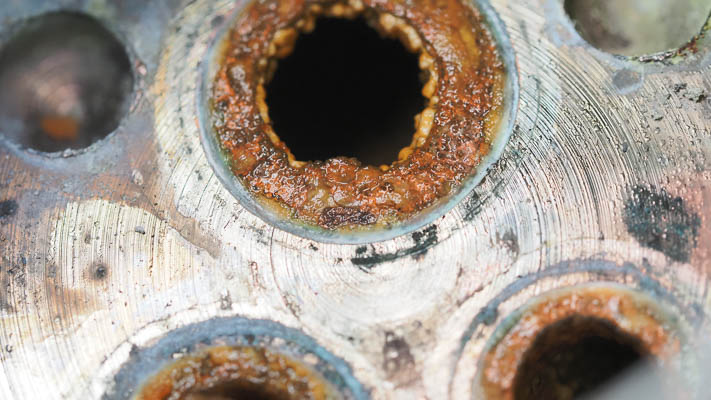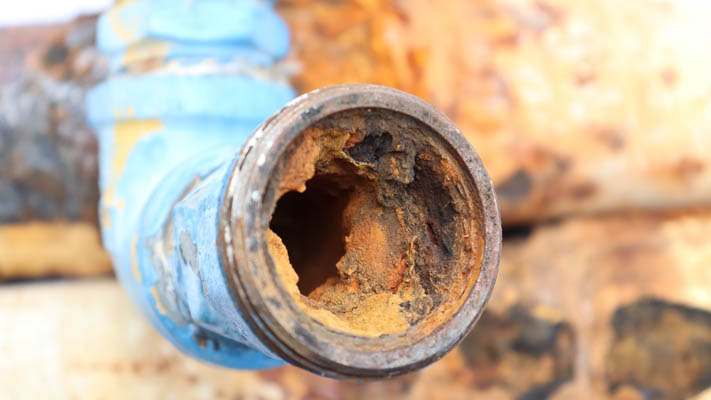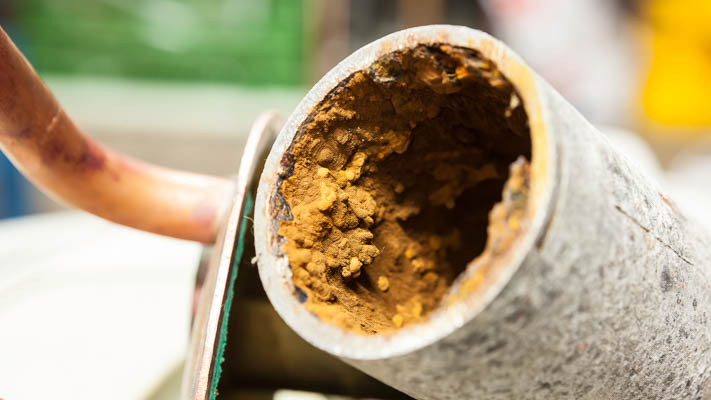What Is Sediment Buildup in Plumbing?
Sediment buildup refers to the accumulation of mineral particles, debris, or rust inside your plumbing .
These particles are usually carried in by your water supply, particularly if you're on a municipal system with aging infrastructure or a private well system with hard water. Over time, the sediment settles at low points in the plumbing system and begins to obstruct water flow.

Common types of sediment include calcium and magnesium from hard water, iron oxide (rust) from corroding metal pipes or water mains, and sand and silt, which are especially common in areas with older municipal water lines or well systems.
The buildup is often slow and gradual, which means it can go unnoticed for years, that is until you start experiencing problems like reduced flow, inconsistent pressure, or discolored water. Left unchecked, sediment buildup can accelerate pipe wear and even damage water-using appliances throughout the home.
Early Signs of Sediment in Your Pipes
Most homeowners don't notice sediment buildup until the symptoms become impossible to ignore. There are several warning signs that suggest sediment may be accumulating inside your plumbing system:
- Decreased water pressure, especially at individual fixtures like sinks or showers
- Discolored water, often brown or yellow, which may indicate rust or dirt
- Unusual taste or odor in your tap water
- Frequent clogging of aerators, showerheads, or appliances
- Popping or banging noises in the pipes when turning taps on or off
In many cases, these issues will start in one area of the home before spreading to others. For example, you might first notice low pressure in the upstairs bathroom, followed by similar issues in the kitchen sink or washing machine. If sediment is present throughout the system, no fixture is immune.
Can Sediment Cause Pipe Corrosion?
Sediment buildup can absolutely contribute to corrosion, particularly in older metal pipes made of galvanized steel or copper.
When sediment settles, it traps moisture and minerals against the interior surface of the pipe, creating the ideal conditions for corrosion to begin. In addition, sediment can react chemically with the metal in your pipes, speeding up the breakdown of the material.
Corrosion caused by sediment may lead to:
- Pinhole leaks, especially in copper plumbing
- Rust flakes entering your water supply
- Thinning pipe walls, eventually resulting in ruptures or bursts
Corroded pipes often look fine from the outside, but inside, they may be filled with rust and mineral deposits that are dramatically reducing their lifespan. In fact, the presence of sediment is one of the main reasons older plumbing systems fail sooner than expected.
Once corrosion begins, flushing the pipes or using chemical cleaners won't fix the issue. In most cases, the damage is already done. That's why recognizing sediment buildup early can help prevent more serious (and expensive) plumbing problems down the line.
When to Consider Repiping to Fix Sediment Issues
If you've been dealing with ongoing issues caused by sediment, it may be time to consider repiping your home.
While some early-stage sediment problems can be managed by flushing your system or water softeners, these solutions don't address damage that has already taken hold inside the pipes. Once corrosion has begun or buildup is significantly restricting flow, replacing the pipes is often the only effective and lasting solution.
Homes with galvanized steel or older copper pipes are particularly vulnerable. These materials are more prone to internal mineral accumulation and corrosion over time, especially in areas with hard water or older municipal water infrastructure. If your home was built before the 1970s and hasn't had a plumbing upgrade, the likelihood of sediment-related damage is even higher.

You might also notice that multiple fixtures throughout your home are affected, not just one or two. In some cases, plumbing inspections using cameras or pressure testing will confirm that internal corrosion and sediment buildup are restricting flow. This can mean a repipe is not just a good idea, but a necessary one.
Repiping is a long-term investment that restores water pressure, improves water quality, and increases the reliability of your plumbing system. Modern materials like PEX tubing are much more resistant to sediment accumulation and corrosion, helping to prevent future problems while improving the day-to-day performance of your home's water supply.
Get your free estimate today
With over 75,000 repipes completed, we've perfected our One-Stop Repipe™ for your home.
Get a Free Repiping Quote for Sediment-Damaged Pipes
Here at Repipe Specialists, we've fully replaced the sediment-damaged plumbing in thousands of homes since 1991. A repipe is a long-term investment that can save you money for years to come. We consistently receive positive feedback from homeowners about their overall repipe experience. We often exceed expectations when it comes to:
- Speed: Our repipe crews typically complete a repipe in a day, returning on another day for wall patching.
- Convenience: Through our One-Stop Repipe™ process, we handle everything from permits, to wall patching, to inspections.
- Cleanliness: Our crews are trained to protect your home while working (we cover all surfaces with protective sheeting), and to clean up fully at the end of each day.
- Peace of Mind: Repipe Specialists is a fully licensed plumber in every state we operate in, and we back all of our repipes with a lifetime warranty.
- Financing programs: To help take the sting out of unplanned repipe expenses, we offer several financing programs.
- Price: As a specialist that performs hundreds of repipes a week, we can deliver high quality repipes at a lower cost vs generalist plumbers. Our quotes typically range from $4,500 to $15,000 depending on the size and complexity of your project. We have an article that covers repipe cost factors in detail.
Schedule a free in-home consult, and one of our local repipe consultants will explain all your copper repipe options and provide you with a written, fixed-price quote. Beat sediment buildup for good, repipe now.

